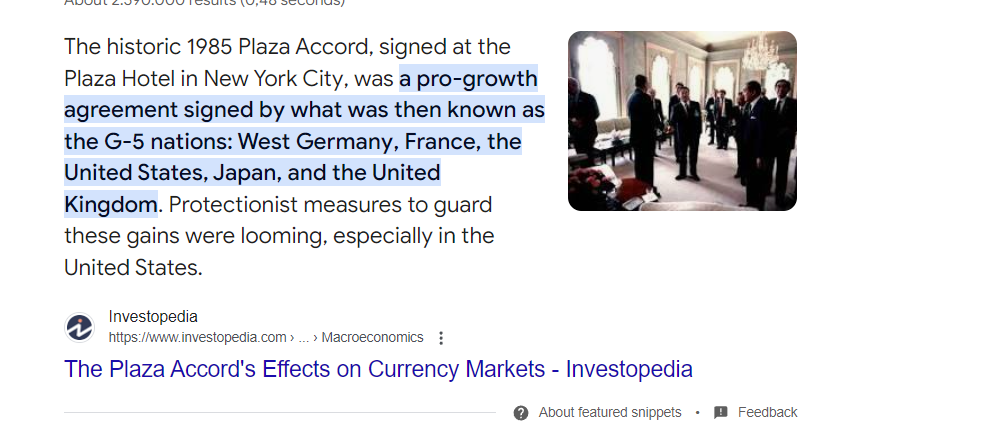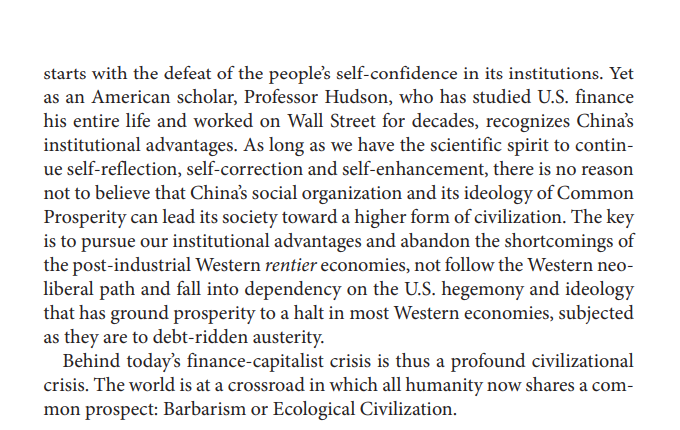-
Posts
2,816 -
Joined
-
Last visited
Content Type
Profiles
Forums
Events
Everything posted by Luca
-
Yeah sure, which leader would not try to negotiate peace here? Why is zelensky sacrificing 100k people+ which are either dead or permanently injured just for a couple of rural regions? Why is the west sponsoring hundreds of billions of dollars for these regions but was unwilling to fund anything in their own countries for other reasons (infrastructure investments, schools, energy etc)? The west escalates this war together with zelensky, the west stopped peace negotiations that could have saved ten thousand people and many damaged regions in ukraine. Negotiated peace is better than war, Putin was and still is willing to give security guarantees but Ukraine has to agree on not joining nato, no foreign military trainings, forbid nazism etc considering that zelensky by now literally IS the west and already sees ukraine joining nato, inviting all the US capitalists over, having US military training, maybe even US military bases close to the Russian border? Which independent and security-orientated country wouldn't interfere or invade here? What would the US do when China does the same to Mexico? https://www.nytimes.com/2023/12/15/world/europe/ukraine-military-recruitment.html#:~:text='People Snatchers'%3A Ukraine's Recruiters,commissions and coercive mobilization tactics. This is horrible, similar to what Russia is doing.
-
I am from Germany, Article 4 of our constitution forbids to force people against their own conscience to fight with a weapon in war. Now in Ukraine, they literally grab young guys who know they will end up dead from the streets and drive them badly trained into a battle they can not win. Even worse, now the guys who fled because they knew it was game over for them are denied consular services to try to force them back into the country that will just grab and sacrifice them at the front lines. It's a pretty sad state of affairs and the pope is right, negotiated peace is better than a war without end. Zelensky should stop his meat grinder, be the bigger man, ignore the West that uses him to fight a proxy war, and take care of the few remaining guys at the front by restarting the negotiations for a peace agreement and get the security guarantees putin is willing to offer. For what is zelensky fighting here? What is there to save that justifies hundreds of billions of dollars to keep this front-line sustainable--> Blackrock etc are all ready to buy up the land, and build the country up so it acts as a satellite and extended market for the US...that's surely bringing putin to withdraw and allow even closer US sphere expansion to their borders...nuts...
-

I Need a Laugh. Tell me a Joke. Keep em PC.
Luca replied to doughishere's topic in General Discussion
Nigerian Warren E Buffet with a T missing haha -

Economic War-US/G7/West vs China (semiconductors)
Luca replied to Luca's topic in General Discussion
I don't mean that investments out of the private sector are inefficient in general. In the US/west these investments are subpar, too little, not well meant, resulting in an almost sort of ghetto system. -

Economic War-US/G7/West vs China (semiconductors)
Luca replied to Luca's topic in General Discussion
The US became so expensive due to the market power of these services and that all of this is in the control of private hands that you need 10-50x as much money to live the same lifestyle I could live in a tier 2/tier 3 city in China. The privatized schools, the privatized healthcare, the privatized daycare for kids, The housing sector. At the same time, investments in basic services outside of the private sector are really inefficient, and public schools are not good often. Subways are dirty and broken, deteriorating social fabric in society. And then imagine how China looks like 10 years down the road, running a mixed public and private economy and not walking into the financialized economy trap...when the sky airs up due to EVs, the automation of production that is not far away on a different continent. The scale of their city design...next decades going to be very interesting, especially in China. -

Economic War-US/G7/West vs China (semiconductors)
Luca replied to Luca's topic in General Discussion
I will -

Economic War-US/G7/West vs China (semiconductors)
Luca replied to Luca's topic in General Discussion
The real economy is the traditional form of capitalism where profits are made through the production of goods by expanding the economy through tangible capital formation and productive investment. Employing labor to produce and sell commodities at a markup. What the US developed into is a financialized economy where manufacturing mostly moved away to other countries while they engaged in wealth extraction through financial channels rather than production and investment. GDP growth in the US literally includes the insane 20% credit card debt US citizens are getting delinquent on now, which has 0 productive value to the economy. Then you have all this housing speculation and appreciation, investment speculation/services which are big parts of GDP, rent-seekers and high rents that push up GDP, banks that don't provide money for tangible investment but do speculation on loans which led to the financial crisis, etc. Thats 30% of the US economy...crazy. Yes, the US has a few shining star mega-cap companies and worldwide financial services providers, those are all basically monopolies. Looking at the US GDP, you can see the impact of this financialized economy, monopolies for healthcare that rip off US citizens, end-game housing market with prices unaffordable for most, and further shrinking manufacturing sector. The point is, China has been building out the real economy and owns the largest labor force worldwide, the most efficient supply chains worldwide, and now slowly the best products worldwide for a cheaper price the US could ever have. Looking at the SP 500, if the market doesn't develop in this western protectionist and war economy against the uprising economies, China can replace many of these businesses with cheaper prices simply because of the low-cost infrastructure the government provides and the fact that their economy is not controlled by these mega-services monopolies that are just very expensive for doing business. That's why the US needs tariffs and trade blockage because their companies can not survive and they arent willing to invite Chinese companies either. That's why the US can only attract manufacturing with huge subsidies. The economy with the cheapest labor pool, most efficient supply chains, and best products wins. BYD, XIAOMI, TEMU, Commodities at cheaper prices, food at cheaper prices...its only a matter of time... At this point chinas economy is self-sufficient enough to develop internally. Yeah, these deflows are providing headwind but the core of china is a powerhouse and they arent bad finding partners globally either with russia, saudis, BRICS etc. Meanwhile the US faces highly inflationary forces with their derisking so I think the incentives over the longterm are pointing towards a "with China" than without. Biden playing a deficit and subsidy game but that's not sustainable. The problem is an uncompetitive manufacturing basis and dependence on foreign countries producing their expensive high margin products. I don't think it can last over time. On the other hand, things like alphabet and Microsoft will and can last but how many Americans work there...alphabet has 150k employees globally...most Americans wont feel the impact of their success, at max in their retirement funds. -

Economic War-US/G7/West vs China (semiconductors)
Luca replied to Luca's topic in General Discussion
Again, zero arguments in this response. There is a good book about this, kicking away the ladder by economist Ha-Joon Chang. -
Microsoft and Alphabet are up 4% and 13% each after Q1 reports, I guess the rally can and will continue!
-
“No one had been talking about justice for servicemen in our country for a long time. But here it is, at least some small percentage of it," Ukrainian military medic Alina Mykhailova said in a post on Facebook. "No one sent us there either, but for some reason, we are there. If you don’t like it, give up your citizenship and go to hell.”
-
So ukrainian men that fled to Europe are now denied basic consular services and are hoped to be forced back into the country where they will be handed European and American weapons to fight for their freedom! Wow... https://www.politico.eu/article/blatantly-illegal-zelenskyy-government-under-fire-for-refusing-issue-consulate-services-ukrainian-men-abroad/
-
Haha nice.
-
+PDD
-

Economic War-US/G7/West vs China (semiconductors)
Luca replied to Luca's topic in General Discussion
Thank you, at least you are replying with arguments now instead of just insults. Also, the text was 4 pages and you used 2 buzzwords in one post, a big difference. Long road ahead. There are many more factors that you don't mention, protectionist measures and corporate espionage are an important part of Western development. Of course, the US is not giving out freebies to other countries... And social market economies (that you probably understand as socialism) score higher on the development indices linked above. Social market economies ARE a form of capitalism. China HAS a form of capitalism. You can see how oppressive US capitalism is once you move up the value chain, hence the trade war. -

Economic War-US/G7/West vs China (semiconductors)
Luca replied to Luca's topic in General Discussion
-

Economic War-US/G7/West vs China (semiconductors)
Luca replied to Luca's topic in General Discussion
China is a post-communist authoritarian state with a state-capitalist economic system. We in the West have state capitalistic economic systems with parliamentary democracies. I really don't understand how anyone of you reads "communist" from the posts above. Especially China with Xi is not communist since communism advocates classless, stateless societies with total communal ownership of the means of production. China has a state with absolute power, the exact opposite. The private sector plays a huge role too and enables investing opportunities similar to us in the west, with the exception of a totalitarian government that has more power to regulate and control negative parts of market forces. So no, I am not a communist and neither is anyone in the CCPs current government. How you can come to this conclusion is not understandable to me. -

Economic War-US/G7/West vs China (semiconductors)
Luca replied to Luca's topic in General Discussion
This is an interesting article: Some have been surprised that the US is not focusing on its exchange rate to boost its competitiveness, as it has done before. In 1971, it ditched the gold standard and devalued the dollar by about one third, as the Japanese yen and Deutschmark strengthened. After the 1985 Plaza accord to depreciate the dollar, the US currency weakened by half against these currencies. The US is not devaluing its dollar now because its debt and deficit levels are very high. Should the dollar halve its value against the yuan, for instance, the resulting inflation will sharply force up interest rates, triggering a debt crisis. A revalued yuan would also mean a much bigger Chinese economy, likely to be larger than America’s. How would that be in America’s interests? The US economic strategy seems to depend on attracting money globally to feed its deficit spending and sustain its high costs. It would allow the US to have its cake and eat it too, maintaining support for domestic industries that require huge financial help, such as the semiconductor and green tech sectors. Many emerging economies have gone down this route, offering protection for domestic businesses in the hope that their success would raise the economy. But all too often, the result was crony capitalism, which caused inflation and low growth, trapping people in poverty. The same outcome could befall the US and Europe. This is not to brush aside China’s overcapacity, which has been around for two decades. Government subsidies exist in China as they do in other countries, but this is not the reason for China’s success. Solar panel prices, for example, have fallen by 95 per cent since China entered the industry two decades ago. Prices of lithium iron phosphate (LFP) batteries for EVs have halved in the past year and are expected to halve again this year. No amount of subsidies could have made this happen. The real story is China’s innovation and scale. The West did not complain about China’s overcapacity in the past because it was good for them. When Chinese companies were mainly making parts and products for global companies, their overcapacity meant customers could squeeze prices and fatten profit margins. Now that Chinese companies want to make and sell their own products, these easy margins are gone. And as Chinese companies rise up the value chain in the global market, a clash of business cultures is shaping up between the West and China. Unlike the cutthroat competition of a century ago, the big capitalists of the West meet in Davos and are not above colluding to limit competition. For too long, product prices have tended to go up; profits have been stable or rising. Corporate managers have been able to pay themselves enormous sums and become rich enough to join the global governing elite. But today’s Chinese capitalists, including the local governments that back them, are more like the Western capitalists of a century ago, when overcapacity, price wars, and government backing were common in the West. These Chinese capitalists want to crush their competition, not coexist over a bottle of wine. Terrified Davos capitalists are therefore demanding protectionist tariffs. One may argue that China, cut off from some markets, would collapse first, ridding the West of Chinese competition. But that is likely to be wishful thinking. Low prices tend to create their own demand. China’s trade in low-priced tech is likely to help many Global South economies break the so-called middle-income trap and this could lead to a self-sustaining boom. The good news is the East-West tensions are not likely to trigger a military war, as many businesses and investors fear. Recent developments in the Middle East and Ukraine have shown that the US does not have the resources to support a big war. Even if the US wanted an arms race with China, it would need to double, even triple, its defense budget – money it doesn’t have. The bad news, however, is that the trade war is going to be much worse. In 1987, US Congressional leaders smashed Japanese electronics on Capitol Hill with sledgehammers. It is a matter of time before they do the same to Chinese solar panels and EVs – but first, they need to find some US-made sledgehammers. https://www.scmp.com/opinion/china-opinion/article/3259939/western-protectionism-will-fail-chinas-success-isnt-down-subsidies -

Economic War-US/G7/West vs China (semiconductors)
Luca replied to Luca's topic in General Discussion
Its an economy with industrial decline that can not compete in manufacturing globally due to an insane amount of financialization. The privatization boosted rents so high, health insurance costs, energy etc...the US still does design but manufacturing is not coming except with strong subsidies (TSMC). The US doesn't even have the labor pool necessary to produce what is designed by few. On the latest 60min show, Gina Raimondo said "we have the best chips in the world". Then lesley stahl said "taiwan has them". And Raimondo said "fair enough". LOL! If increasingly half of your GDP is business services, absurd health insurance money collectors and rich banks and landlords, how does the real economy look like? Designed in California, made in China. Now when China designs in China and makes in China, the product is more competitive than what the US has and it is game over. Thats why you have the tariff discussion and other moves to slow china down from the declining economic reality in the US. So the US got into a position by killing, stealing, and committing genocide. Now that they have one of the largest controls in the world, nobody is allowed to do anything remotely similar because that would be...bad. Right... Which creates the opportunity today doesn't it? That capital went into US markets and left China with the pathetic valuation it has now -

Economic War-US/G7/West vs China (semiconductors)
Luca replied to Luca's topic in General Discussion
The EU also faces severe internal problems because of our economy's contradictions, too few job opportunities, and little to no wage growth for a large percentile that is radicalizing now and changed their voting behavior towards more radical politicians with increasingly violent language... -
Added to 3x Kweb
-

Economic War-US/G7/West vs China (semiconductors)
Luca replied to Luca's topic in General Discussion
If you are not here to discuss arguments, please refrain from posting simple one-liner comments that reduce complex political and economic realities to buzzwords. It adds nothing to the conversation and topic. Thank you. -

Economic War-US/G7/West vs China (semiconductors)
Luca replied to Luca's topic in General Discussion
I think economies that are in denial about the negatives of late-stage capitalism and refuse to regulate against it will not survive the next 50-100 years and will collapse under internal stressors. -

Economic War-US/G7/West vs China (semiconductors)
Luca replied to Luca's topic in General Discussion
Did we read the same text? He is talking about a mixed public and private economy, that's pretty much the case already in China and also in the European social market economies like Germany, Sweden, Finland, etc. There is no state planning for production but state planning around production so it becomes more efficient and effective. If you understand mixed economies as socialism then yes, I am a socialist. But I am this because it is a system that works better over the longterm, achieves higher prosperity for society, and even higher investment returns over time. -

Economic War-US/G7/West vs China (semiconductors)
Luca replied to Luca's topic in General Discussion
Pretty good summary of the geopolitical situation in 2024 -

Economic War-US/G7/West vs China (semiconductors)
Luca replied to Luca's topic in General Discussion









